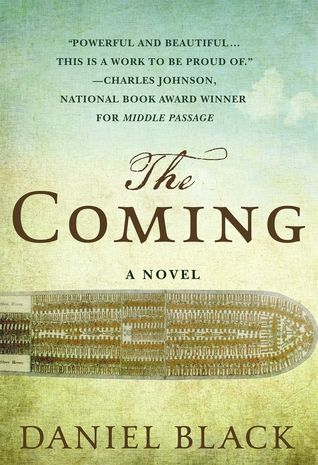Reimagining the Unthinkable: A Review of The Coming, by Daniel Black
 Daniel Black’s fifth novel, The Coming (St. Martin’s Press, 2015),is a nod to Toni Morrison’s suggestion that stories about the Middle Passage did not seep into the African American oral tradition and hence the literature and culture. Black imagines the experiences of millions of abducted Africans in his novel and directs the reader’s attention to the horrific voyage with his epigraph from Sonia Sanchez’s evocatively gritty poem “Improvisation” found in the collection Wounded in the House of a Friend (1997). Presented in three parts, the novel follows a collective of Africans from disparate tribes and addresses life before European contact, the objectification of the African during the Middle Passage, to their resolute desires to survive and tell and preserve their stories in their new land. In the end, it speaks to the will and desire to survive and thrive as a people.
Daniel Black’s fifth novel, The Coming (St. Martin’s Press, 2015),is a nod to Toni Morrison’s suggestion that stories about the Middle Passage did not seep into the African American oral tradition and hence the literature and culture. Black imagines the experiences of millions of abducted Africans in his novel and directs the reader’s attention to the horrific voyage with his epigraph from Sonia Sanchez’s evocatively gritty poem “Improvisation” found in the collection Wounded in the House of a Friend (1997). Presented in three parts, the novel follows a collective of Africans from disparate tribes and addresses life before European contact, the objectification of the African during the Middle Passage, to their resolute desires to survive and tell and preserve their stories in their new land. In the end, it speaks to the will and desire to survive and thrive as a people.
If neoresistance narratives are contemporary stories that imagine the difficult subject of slavery and render meaning that informs the condition of blacks today, then Black has achieved his aim. The author gives voice to the historical experience by documenting the humanity of those who suffered.
If neoresistance narratives are contemporary stories that imagine the difficult subject of slavery and render meaning that informs the condition of blacks today, then Black has achieved his aim. The narrator explains that “We promised our gods that, if we were successful, we’d tell the story of our unthinkable journey and remind our people never to lose faith. We made all sorts of promises on that ship.” The author gives voice to the historical experience by documenting the humanity of those who suffered. A series of miniplots and characters chart the experiences. Moreover, he situates greed as the culprit that led to the fall of the African and his emulation of the European sojourners.
The language of the novel has the quality of African proverbs—simple, artful, and instructive. There is an almost philosophical element to the story of the dispersal of Africans. The story is told from the second-person plural perspective in keeping with traditional African cosmological impulses to celebrate the community. It signifies on African slavery, the atrocities of the middle passage, and the total objectification of Africans. While it is a much-needed account, it is a bit didactic in its content. It has something of a textbook quality. Even so, it is well work the trek.
Parkville, Maryland










